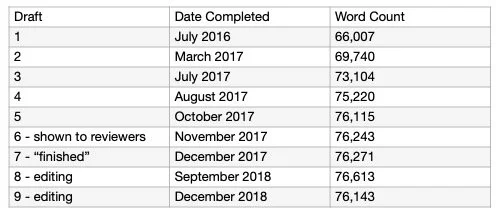How long does it take to write a novel?
SUBIGUS
The writing of the Subigus novel was a journey lasting 14 years from initial concept to publication. If you have read the book, it will come as little surprise that the novel actually began life as a film script. I will talk more about my writing style in my next post, suffice to say I favour a fast-paced story that is light on descriptive waffle, so a film script is an ideal medium for me. I had the initial idea for the story in 2004, but it wasn’t until 2007 that Nick Pilborough and I set about fleshing that out into an actual script. By 2008, we had completed the “treatment” and half a script, before life began to get in the way of further progress. Living in different countries certainly didn’t help the creative process!
With progress stalled, and increasing doubts about our ability to sell a script to Hollywood, the project was in danger of fizzling out. In 2014, I took the decision to resurrect the story and turn it into a novel, completing the novel plan in January 2015. Writing commenced shortly afterwards in February 2015, culminating in the publication of the book in December 2018.
I spent a total of 3 years and 11 months working seriously on the Subigus novel. It is difficult to say how many hours I devoted to my writing during the time. Unfortunately I didn’t think to keep a record as I did with the sequel, Consevius. This is particularly frustrating as Subigus took a lot, lot longer to write than Consevius - if I were to make an estimate, I’d say up to 5 times longer. It is fair to say that the work consumed a great deal of my time during the 4 year period; for instance, to create space for writing I went part-time at my day job for around 3 years.
Timeline
Idea: 2004
Film treatment: 2007
Film script: 2008
Novel plan: January 2015
First draft completed: July 2016
Published: December 2018 (3 years 11 months for the novel)
Drafts
CONSEVIUS
Writing a sequel is a much more straightforward process than writing a first novel. Think of all the advantages you have:
You already have an outline of the story in your head - while I was writing Subigus I already had a 3-book story arc in mind.
You’ve developed your main characters.
You’ve developed your writing style, meaning your drafts are higher quality and there are fewer of them.
You have the confidence that you can finish a book.
You’ve already worked out technical details like how to format the novel for publication, how to produce your cover art, and what tax forms to fill-in!
I want to stress this because writing Consevius was a much, much quicker process than writing Subigus, even though I consider Consevius a much better book. I kept detailed records of the amount of time I spent writing Consevius and the results are - surprising…
I spent only 170 hours on this book over a period of 2 years and 4 months.
Assuming a 5 day working week, that’s almost exactly 30 mins per day. I say 5 days because you do need downtime (I try to commit to either write OR workout every day). This is interesting because I have found that working 30 minutes per day is absolutely the key to success in novel writing. Work on Subigus was sporadic, with periods of intense activity, followed by long periods of none. That sort of inconsistent work is very inefficient. Imagine you haven’t written anything for 2 months, then you come back to it. Much of your time will be spent re-reading what you wrote last time in a vain attempt to remember what you said, or which character did what, or in the worst cases - the names of your characters themselves!
Advantages of committing to 30 mins per day:
Anyone can find 30 mins. On the bus to work, during your lunch break, before you go to sleep. If you don’t believe you have time, take a look at the screen time app on your phone.
The story remains fresh in your mind - no more re-reading what you wrote last time.
It is difficult to do high-quality creative work for more than a few hours per day, so long “catch-up” sessions rarely work. Personally I find 4 hours is the absolute maximum before the quality begins to suffer. Don’t assume you can make up for 2 months of doing nothing over a long weekend.
You get a sense of progress.
If you really aren’t “feeling it” you can stop after 30 mins with no guilt.
Avoids long periods without any progress.
Timeline
Planning: December 2018
Writing begins: March 2019
First draft completed: July 2020
Re-writes: July 2020 - April 2021
Editing: April 2021 - July 2021
Published: July 2021 (2 years 4 months)
Drafts
Time Invested
Planning: 24 hours
First draft: 82 hours (about 20 mins per day assuming a 5 day week)
Re-writes: 26 hours
Editing: 24 hours
Publishing: 14 hours
TOTAL: 170 hours


